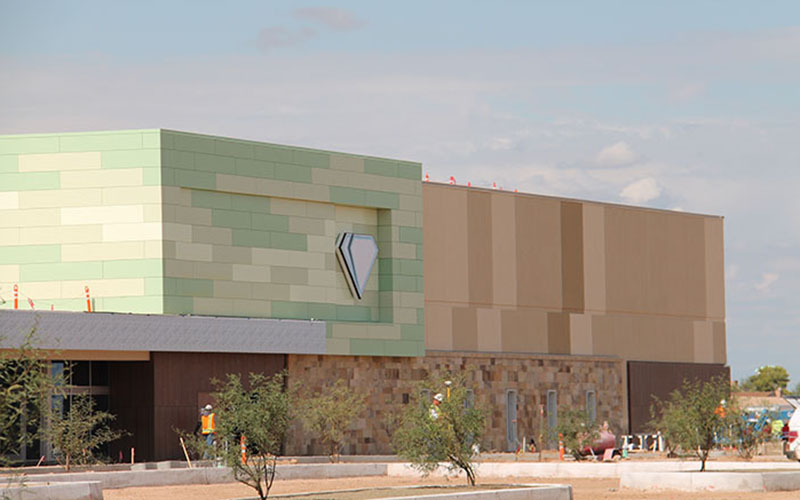
The Tohono O’odham Nation acquired 135 acres in Glendale that converted to reservation land, where it opened the Desert Diamond-West Valley resort and casino. Repeated legal challenges have failed, even after the casino opened in December. (Photo by Megan Siquieros/Desert Diamond)
WASHINGTON – A federal appeals court Tuesday rejected the latest in a long line of challenges to the Tohono O’odham casino that opened in Glendale in December.
A three-judge panel of the 9th U.S. Circuit Court of Appeals said a lower court was right to reject challenges to the Desert Diamond West Valley casino and resort raised by the state of Arizona and by the Gila River and the Salt River Pima-Maricopa tribes.
The courts said the language of the law was clear – the Tohono O’odham have a right to run a casino on property they bought in Glendale that is now considered tribal land.
“This appeal requires us to consider whether sophisticated, represented parties really meant what they wrote in a gaming compact that was duly executed after years of tedious negotiations,” Judge Carlos Bea wrote in the opinion.
He said the language of all agreements and acts in question are “unambiguous and not reasonably susceptible to plaintiffs’ interpretation.”
Attorneys for the state and the other tribes did not respond to requests for comment Tuesday. But the decision earned praise from the Tohono O’odham, who said it was the 19th straight time that a court or federal agency has sided with the tribe in challenges to the casino.
“This is a great day for the gaming operation and the nearly 600 families of the employees at our West Valley facility,” said Tohono O’odham Gaming Enterprise CEO Andy Asselin, in a statement.
The tribe has been operating slots at the casino and will now be able to integrate more table games there.
“Once we move forward with Class III gaming, we will be able to create 3,000 more jobs here in the community,” Asselin said.
Tohono O’odham Chairman Edward Manuel said in the same statement that the latest ruling “leaves no doubt that the Nation has the right to move forward with Class III gaming.”
The case has its roots in the 1960s, when a federal dam project on the Gila River flooded thousands of acres of farmland on the Tohono O’odham reservation, ultimately leaving a large portion of the reservation “economically useless.”
Congress agreed to take 9,880 acres of that land, giving the tribe $30 million to buy replacement land elsewhere.
The tribe used some of that money in 2003 to buy parcels of land on a “county island” – an unincorporated area of Maricopa County land that is surrounded by incorporated parts of Glendale. The land was taken into trust by the federal government, giving it the status of reservation land, and the tribe in 2009 announced plans to build a casino and resort there.
The announcement was swiftly condemned by neighbors and by other tribes in the Valley, who sued to block the casino, which they noted was hundreds of miles from the rest of the Tohono O’odham reservation and violated federal and state gaming laws.
Repeated legal challenges have since failed. That led Rep. Trent Franks, R-Glendale, and Sen. John McCain, R-Arizona, to introduce companion bills in in the House and Senate last year that would prohibit “gaming activities on certain Indian lands in Arizona until the expiration of certain gaming compacts.”
Franks’ version of the Keep the Promise Act of 2015 died in November, in an attempt to push it through the House as an emergency measure just weeks before the scheduled opening of the casino.
McCain’s version of the bill is still pending in the Senate. Neither Franks nor McCain responded to requests for comment Tuesday.
In his statement, however, Manuel said it’s time to move on.
He asked opponents to “drop all outstanding, misguided challenges so that we can work together in partnership to create positive economic development for the Tohono O’odham Nation, the West Valley, and all of Arizona,” his statement said.